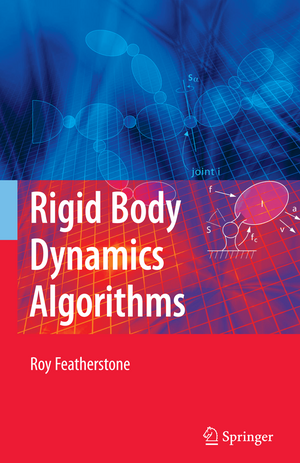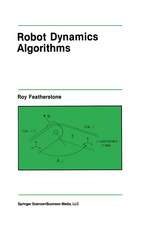Rigid Body Dynamics Algorithms
Autor Roy Featherstoneen Limba Engleză Hardback – 26 noi 2007
and how to analyze it, and it presents the most comprehensive collection of the best rigid-body dynamics algorithms to be found in a single source. The use of spatial vector notation greatly reduces the volume of algebra which allows systems to be described using fewer equations and fewer quantities. It also allows problems to be solved in fewer steps, and solutions to be expressed more succinctly. In addition algorithms are explained simply and clearly, and are expressed in a compact form. The use of spatial vector notation facilitates the implementation of dynamics algorithms on a computer: shorter, simpler code that is easier to write, understand and debug, with no loss of efficiency.
| Toate formatele și edițiile | Preț | Express |
|---|---|---|
| Paperback (1) | 1216.16 lei 43-57 zile | |
| Springer Us – 23 aug 2016 | 1216.16 lei 43-57 zile | |
| Hardback (1) | 1217.86 lei 43-57 zile | |
| Springer Us – 26 noi 2007 | 1217.86 lei 43-57 zile |
Preț: 1217.86 lei
Preț vechi: 1485.19 lei
-18% Nou
Puncte Express: 1827
Preț estimativ în valută:
233.03€ • 243.96$ • 192.82£
233.03€ • 243.96$ • 192.82£
Carte tipărită la comandă
Livrare economică 07-21 aprilie
Preluare comenzi: 021 569.72.76
Specificații
ISBN-13: 9780387743141
ISBN-10: 0387743146
Pagini: 272
Ilustrații: IX, 272 p.
Dimensiuni: 155 x 235 x 21 mm
Greutate: 0.6 kg
Ediția:2008
Editura: Springer Us
Colecția Springer
Locul publicării:New York, NY, United States
ISBN-10: 0387743146
Pagini: 272
Ilustrații: IX, 272 p.
Dimensiuni: 155 x 235 x 21 mm
Greutate: 0.6 kg
Ediția:2008
Editura: Springer Us
Colecția Springer
Locul publicării:New York, NY, United States
Public țintă
ResearchTextul de pe ultima copertă
Rigid Body Dynamics Algorithms presents the subject of computational rigid-body dynamics through the medium of spatial 6D vector notation. It explains how to model a rigid-body system and how to analyze it, and it presents the most comprehensive collection of the best rigid-body dynamics algorithms to be found in a single source. The use of spatial vector notation greatly reduces the volume of algebra which allows systems to be described using fewer equations and fewer quantities. It also allows problems to be solved in fewer steps, and solutions to be expressed more succinctly. In addition algorithms are explained simply and clearly, and are expressed in a compact form. The use of spatial vector notation facilitates the implementation of dynamics algorithms on a computer: shorter, simpler code that is easier to write, understand and debug, with no loss of efficiency.
Unique features include:
• A comprehensive collection of the best rigid-body dynamics algorithms
• Use of spatial (6D) vectors to greatly reduce the volume of algebra, to simplify the treatment of the subject, and to simplify the computer code that implements the algorithms
• Algorithms expressed both mathematically and in pseudocode for easy translation into computer programs
• Source code for many algorithms available on the internet
Rigid Body Dynamics Algorithms is aimed at readers who already have some elementary knowledge of rigid-body dynamics, and are interested in calculating the dynamics of a rigid-body system. This book serves as an algorithms recipe book as well as a guide to the analysis and deeper understanding of rigid-body systems.
Unique features include:
• A comprehensive collection of the best rigid-body dynamics algorithms
• Use of spatial (6D) vectors to greatly reduce the volume of algebra, to simplify the treatment of the subject, and to simplify the computer code that implements the algorithms
• Algorithms expressed both mathematically and in pseudocode for easy translation into computer programs
• Source code for many algorithms available on the internet
Rigid Body Dynamics Algorithms is aimed at readers who already have some elementary knowledge of rigid-body dynamics, and are interested in calculating the dynamics of a rigid-body system. This book serves as an algorithms recipe book as well as a guide to the analysis and deeper understanding of rigid-body systems.
Caracteristici
A comprehensive collection of the best rigid-body dynamics algorithms Use of spatial (6D) vectors to greatly reduce the volume of algebra, to simplify the treatment of the subject, and to simplify the computer code that implements the algorithms Algorithms expressed both mathematically and in pseudocode for easy translation into computer programs Source code for many algorithms available on the internet Rigid Body Dynamics Algorithms is aimed at readers who already have some elementary knowledge of rigid-body dynamics, and are interested in calculating the dynamics of a rigid-body system. This book serves as an algorithms recipe book as well as a guide to the analysis and deeper understanding of rigid-body systems

















